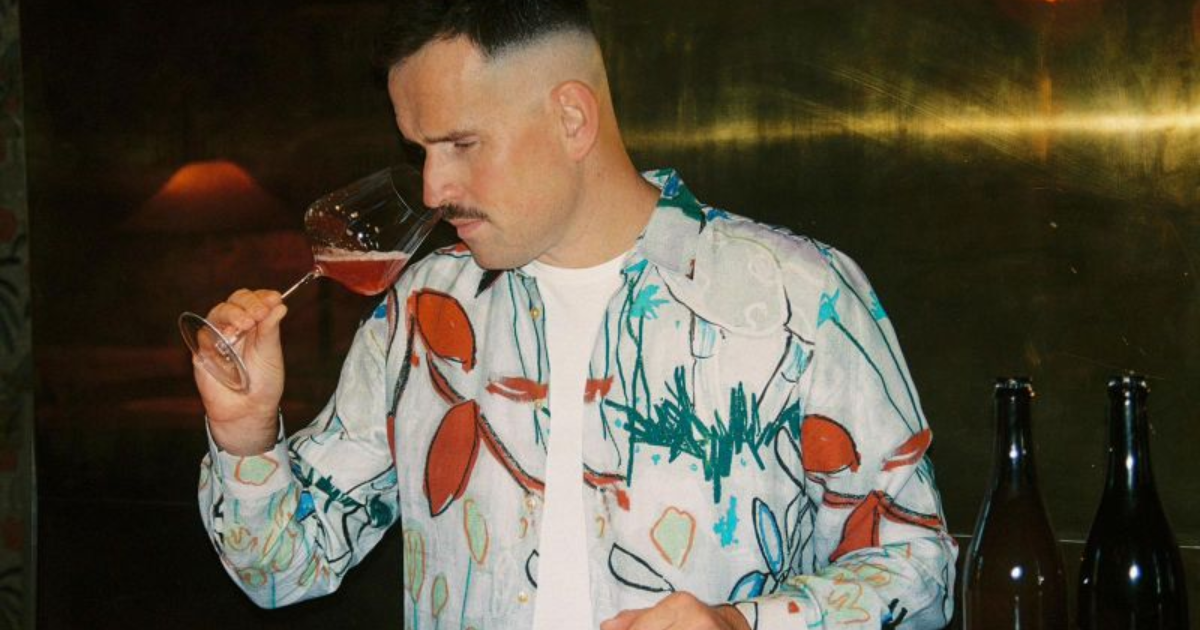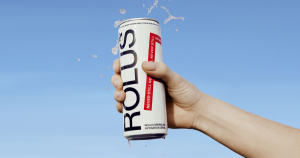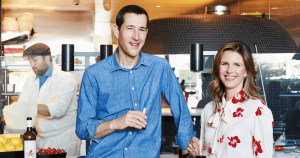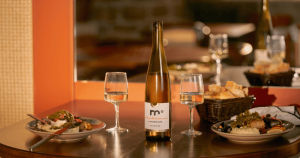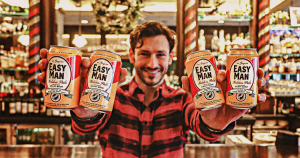Partner Content: Ace of Cups
Roman Sydorenko’s journey into the alcohol alternatives space is an unexpected one. With a background in tech and a passion for all things gourmet, his life revolved around fine dining, wine pairings, and the unending quest for complex flavors. However, a near-fatal health scare during a Michelin-starred meal forced Roman to reexamine his relationship with alcohol. Confronted with a diagnosis of atrial fibrillation—the insidious “silent killer”—he opted for a radical shift in lifestyle, ditching alcohol entirely. Nevertheless, his profound appreciation for complex flavors remains unchanged.
In this interview, Roman shares how that turning point led him to discover non-alcoholic beverages that don’t just rival, but often outshine, the complexity of traditional wines. From his “Aha!” moment with MURI Passing Clouds to his passion for investing in the future of beverages, Roman is now on a mission to challenge the longstanding supremacy of wine—and he’s just getting started.
Dry Atlas: Roman, walk us through your journey into the non-alcoholic beverage space. Your background is in tech. What led you to the gourmet beverage world?
Roman Sydorenko: I spent my career in the tech industry, working in both the enterprise and consumer sectors. By 30, I was selling enterprise software for businesses across Eastern Europe and Central Asia—from banks to oil giants. Mastering the art of “wining and dining” was part of the job, and I got hooked on the lifestyle it offered. I even centered my identity on being a gourmand and wine connoisseur.
The corporate world lost its charm pretty quickly, and I pivoted to launching Pure, a sex-positive dating app that became my life for the next 10 years. Selling it two years ago wasn’t just an exit; it freed me to go all in, living the dream with travel, top-tier food, and the best wines.
Then, during a meal at Alma, a Michelin-starred restaurant in Lisbon, I nearly died. I lost consciousness, was hospitalized, and spent the night in the ICU, where I was diagnosed with atrial fibrillation (AFib), known as the “silent killer.” This condition, undetectable until it strikes, can be fatal, leading to strokes or heart attacks. At just over 40, I was forced to confront the reality that my lifestyle, particularly my wine consumption, was to blame.
Despite signs like elevated blood pressure, cholesterol, and pre-diabetes, I had brushed them off as part of getting older. It wasn’t until later that I realized the fleeting pleasures of drinking were really borrowing time from my future. It was a high-interest loan on my health.
I used to think my life would be meaningless without wine—like, what’s the point of eating at Michelin-starred restaurants if I can’t drink Burgundy? Fortunately, at my favorite restaurant in southern Portugal, Ocean, a sommelier introduced me to MURI Passing Clouds. That was my “Aha!” moment: proof that flavor complexity and pleasure can exist without alcohol. This motivated me to explore further.
DA: Wow, that’s such an impactful story. I’m so happy you were okay. It’s also wonderful that these alternatives had hit the market just before you needed them most. I’m curious: given your wine background, why not dive into the world of dealcoholized wine? What drew you specifically to what you call gourmet specialty beverages?
RS: My taste in wines has always been quite specific. I sought powerful, complex, and multilayered flavors and aromas—think Meursault and Chassagne-Montrachet from Burgundy, or vintage Champagne with extended time on the lees. With dealcoholized wines, I found it difficult to find anything I could even call “OK.” It’s “Meh” at best. Most dealcoholized wine brands purchase bulk wine en masse and send it to alcohol removal factories. This results in below-average liquids vaguely labeled as wine from Northern Italy or Languedoc, with no mention of grape variety, terroir, or winemaker—a practice unthinkable for true wine lovers. While there are exceptions, like Zeronimo and Oceano Zero, I believe the broader wine industry needs a major, phoenix-like transformation. The current practices are unsustainable and simply awful, from the harm monoculture farming does to biodiversity to the industry’s denial of alcohol’s damage to people and society—including blocking cancer warning labels.
Given this, I’ve decided not to invest in anything related to dealcoholized wine.
Part of my motivation to support the new wave of “no and low” beverage entrepreneurs comes from a deep frustration with how the wine and hospitality industries have failed me and countless others like me. They convinced me that ordering an eight-glass wine pairing at a restaurant was not only acceptable but a sign of sophistication. That sharing a bottle of wine between two people over dinner was perfectly normal, even great, and that it could be done regularly without consequence.
One of the most irritating things about dining out is how, right after they ask about allergies, the next question is always, “Can I offer you a glass of champagne?” I’ve just arrived, intentionally hungry, and I’m about to embark on a multi-hour feast, yet they’re already pushing alcohol. Then it’s multiple glasses of wine as part of the pairing, and just when you think it’s over, they offer cocktails after the petit fours. By the end of the three or four hour dinner, many diners are wasted well beyond what the CDC defines as dangerous binge drinking. Restaurants obsess over every ingredient, making sure no pesticides or harmful chemicals touch your food. Then, at the same time, they pour glass after glass of alcohol, essentially poisoning you under the guise of “hospitality.” Why would you put your customers through that?
DA: You raise a lot of strong points. Now that you’re aiming to impact the broader hospitality industry, you’re going beyond your personal interests and investments. Tell us about what you’re doing on the investment side with Ace of Cups, your angel syndicate.
RS: Absolutely. In the tech world, multiple angel investor communities are well-established, where people collaborate and make a real impact as early-stage investors. It’s also a democratized space, with co-investment opportunities through special purpose vehicles (SPVs) starting with checks as small as $1,000. But in the no-and-low beverage space, there’s nothing like that yet, and that presents a huge opportunity. Platforms like SydeCar make managing these deals easier, offering the infrastructure that’s currently missing.
At Ace of Cups, I want to help founders of emerging gourmet beverage brands access capital from purpose-driven investors, without having to juggle endless pitches and legal complexities. I’m putting together a group of like-minded angel investors who share my passion for creating a healthier, more sustainable future in beverages. This is a pro bono, passion-driven initiative for me. I’m not charging carry or management fees. My goal is to bring a new wave of investors into the space to support innovative brands and help reshape an industry that’s far too reliant on alcohol. Together, we can empower founders to offer better, more sustainable alternatives for both people and the planet.
DA: From an investment perspective, what criteria are most important to you as you look at this gourmet beverage category?
RS: First and foremost, I have to actually like the beverage. I’m not going to invest in something I wouldn’t happily drink myself. Flavor complexity is key. I want layers, depth, and a bit of intrigue. Anyone can throw together ingredients, but it takes true skill to craft something that makes you stop and appreciate it.
When people pitch to me, I dig into their motivation. Right now, everyone’s jumping on the non-alc bandwagon because the media has turned it into the next gold rush. But I’m not here for passing trends or pump-and-dump schemes. I’m in it for the craftsmanship, the authenticity, and backing people who are genuinely passionate about what they’re creating.
And I’m particularly drawn to those committed to a fully non-alcoholic future. I’d never invest in businesses that also sell alcohol. The world needs less alcohol, not more.
DA: Can you talk about one of your investments and what drew you to that particular brand?
RS: Let’s take MURI as an example. What really drew me in was their approach to complexity. They meticulously combine flavors, crafting something multi-layered yet approachable. Even after drinking well over a hundred bottles, I’m still impressed. Their obsession with exploring ingredients—whether familiar or obscure—is fascinating. They’re true pioneers, constantly pushing boundaries. To me, the MURI team has the perfect blend of skill and genuine motivation.
To do this kind of work, you really have to be a maker. It’s not something you can outsource, like “Let me hire someone to create a recipe, handle production, and put it all together.” Sure, that’s an option, but I’m a big believer in people doing things with their own hands. When I visited the MURI team in Copenhagen and saw how hands-on they are, it became clear that their approach is authentic. Supporting that kind of craftsmanship is really important to me.
DA: More broadly, you have an interest in fermentation. Can you talk about fermentation within gourmet beverages? What’s exciting about that?
RS: Fermentation is everywhere these days. I’m forever grateful to René Redzepi for leading the fermentation revolution—it’s become so much more common, even in home kitchens where people are making everything from kimchi to kombucha to kvass.
But let’s talk about kombucha for a moment. When most people hear the word, they probably don’t think of it as a gourmet drink. It’s often sweet, intense, and pretty straightforward—usually lacking depth and complexity. It can be overwhelmingly sugary or acidic. Personally, I struggle to find a kombucha in the supermarket that I actually enjoy.
But trailblazers like Ama Brewery in the Basque Country are changing that. They’ve moved away from the term “kombucha” entirely, calling their fermented, aged single-origin teas “pet-nat tea.” Wilder Land from the Netherlands is using rare ingredients like meadowsweet, mint, and smoked birch leaf to craft what they call botanical kombucha. These are great examples of how brands can stand out in an increasingly crowded space.
It’s also interesting to see places like Alchemist and Noma still relying on homemade kombucha for their non-alcoholic pairings. However, water kefir grains are gaining popularity, too, likely because they offer more flexibility and a broader range of flavors to work with. Koji fermentation is another rising trend. MURI recently launched a limited-edition KRS1, a koji-based drink infused with cherry seeds and smoked lavender water kefir. Koji is still pretty rare, and most people don’t even know what it is, but the appetite and appreciation is out there.
Looking ahead, I think we’re entering what could be called the second or even third wave of fermentation revolution. We’ll likely see more specialized, rare fermentations, along with techniques from the kitchen, like roasting, smoking, pickling, and grilling, being integrated into the process.
DA: What about tea-based beverages?
RS: As someone who’s 100% sober and follows a 16:8 intermittent fasting regime, I prioritize drinks that won’t break my fast, and tea has become my go-to beverage. I cold brew about two liters of various teas every day, and it’s now my main source of hydration. I used to buy bottled Japanese teas from Ito En, but the amount of plastic waste was a nightmare. After discovering Hario cold brew bottles—an incredibly convenient half-liter container with a built-in filter—I started to do everything myself.
Now, I’m constantly sampling new teas, with my favorites being Gyokuro, a shaded green tea from Japan, and high mountain oolongs from Taiwan. One of the best non-alcoholic pairings I’ve ever experienced was at Frantzén, a Michelin three-star restaurant in Stockholm, where the highlight was a cold-brewed Dong Ding tea from Taiwan with oxidized apple juice and an infusion of crispy crackers made from mochi rice. It was the closest thing to a proper Meursault I’ve ever had.
I truly believe that high-quality, single-origin teas from China and Japan, are perfect bases for specialty beverages. The mizudashi technique, which cold brews tea for up to 72 hours, can create a complex, multilayered flavor profile that’s ideal to be paired with food. In Japan, there’s a growing market for premium bottled cold-brew teas served in restaurants as sophisticated, standalone pairings, with companies like Royal Blue Tea leading the charge.
DA: Looking ahead, what do you think the future of fine dining will look like?
RS: My mission is clear: to disrupt how the hospitality industry approaches beverages, especially alcohol. Wine’s near-sacred status in fine dining is long overdue for a re-evaluation. As people prioritize health, longevity, and well-being, the days of turning a blind eye to alcohol’s impact are coming to an end.
Take smoking, for example. Once, banning it in restaurants was a radical move. Now, the idea of someone smoking indoors is unimaginable. I think wine is on a similar trajectory. Wine pairings will evolve with more non-alcoholic options and smaller, more thoughtful pours. It’s already happening at places like Coda in Berlin, where they serve 50 ml pours with their pairings.
I envision restaurants offering spittoons so diners can enjoy the nuances of a wine—the flavor, body, and terroir—without having to drink glass after glass. I want to be the catalyst for this change, making responsible drinking and non-alcoholic pairings the new gold standard in fine dining. It’s going to take bold, forward thinkers to challenge the status quo, and I’m ready to be part of that shift.
For more from Roman, see his 10 Must-Try Gourmet Specialty Beverages to Outclass Your Wine Lineup. You can also follow his Insights on LinkedIn. Interested in Ace of Cups? Apply to join as an investor or apply to pitch today.


